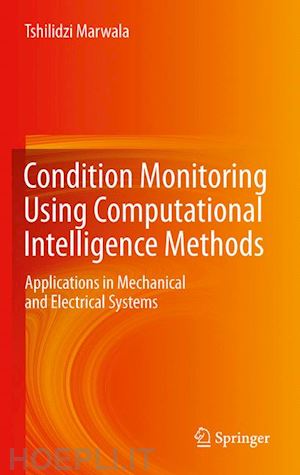
Questo prodotto usufruisce delle SPEDIZIONI GRATIS
selezionando l'opzione Corriere Veloce in fase di ordine.
Pagabile anche con Carta della cultura giovani e del merito, 18App Bonus Cultura e Carta del Docente
Condition Monitoring Using Computational Intelligence Methods promotes the various approaches gathered under the umbrella of computational intelligence to show how condition monitoring can be used to avoid equipment failures and lengthen its useful life, minimize downtime and reduce maintenance costs. The text introduces various signal-processing and pre-processing techniques, wavelets and principal component analysis, for example, together with their uses in condition monitoring and details the development of effective feature extraction techniques classified into frequency-, time-frequency- and time-domain analysis. Data generated by these techniques can then be used for condition classification employing tools such as:
•
fuzzy systems; rough and neuro-rough sets; neural and Bayesian networks;hidden Markov and Gaussian mixture models; and support vector machines.Introduction to Condition Monitoring.- Data Gathering Methods.- Preprocessing and Feature Selection.- Condition Monitoring Using Neural Networks.- Condition Monitoring Using Support Vector Machines.- Condition Monitoring Using Neuro-fuzzy Methods.- Condition Monitoring Using Neuro-rough Methods.- Condition Monitoring Using Hidden Markov Models and Gaussian Mixture Models.- Condition Monitoring Using Hybrid Techniques.- Condition Monitoring Using Incremental Learning with Genetic Algorithms.- Conclusion.
Tshilidzi Marwala is the Executive Dean of the Faculty of Engineering and the Built Environment at the University of Johannesburg. He was previously a full Professor of Electrical Engineering as well as the Carl and Emily Fuchs Chair of Systems and Control Engineering at the University of the Witwatersrand. He is a Fellow of the Royal Society of Arts as well as the Royal Statistical Society and a Senior Member of both the IEEE and the ACM. He holds a PhD in Engineering from the University of Cambridge and a PLD from Harvard University in the USA. He was a post-doctoral research associate at Imperial College (London) working in the general area of computational intelligence. He was a visiting fellow at Harvard University and Cambridge University. His research interests include the application of computational intelligence to mechanical. civil, aerospace and biomedical engineering.
Professor Marwala has made fundamental contributions to engineering including the development of the concept of pseudo-modal energies and the development of the Bayesian framework for solving engineering problems such as finite-element-model updating. He has supervised 40 masters and PhD students many of whom have proceeded to distinguish themselves at universities such as Harvard, Oxford and Cambridge. He has published over 200 papers in archival journals, proceedings and book chapters and holds 3 patents. He has published three books: Computational Intelligence for Modelling Complex Systems published by Research India Publications, Computational Intelligence for Missing Data Imputation, Estimation, and Management: Knowledge Optimization Techniques published by the IGI Global Publications (New York) and Finite Element Model Updating Using Computational Intelligence published by Springer (2010); he has a fourth, Conflict Modeling Using Computational Intelligence under contract with Springer’s computer science list. He is the Associate Editor of 4 journals including theInternational Journal of Systems Science and his work has appeared in prestigious publications such as New Scientist.











Il sito utilizza cookie ed altri strumenti di tracciamento che raccolgono informazioni dal dispositivo dell’utente. Oltre ai cookie tecnici ed analitici aggregati, strettamente necessari per il funzionamento di questo sito web, previo consenso dell’utente possono essere installati cookie di profilazione e marketing e cookie dei social media. Cliccando su “Accetto tutti i cookie” saranno attivate tutte le categorie di cookie. Per accettare solo deterninate categorie di cookie, cliccare invece su “Impostazioni cookie”. Chiudendo il banner o continuando a navigare saranno installati solo cookie tecnici. Per maggiori dettagli, consultare la Cookie Policy.